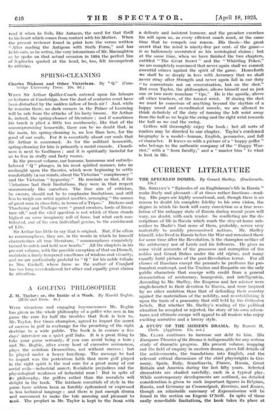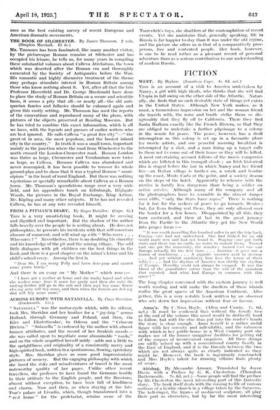CURRENT LITERATURE
THE SPECKLED DOMES. By Gerard Shelley. (Duckworth. 15a.) MR. SHELLEY'S "Episodes of an Englishman's life in Russia" make lively and pleasant—if at times rather facetious—reading. His pages are highly sensational, and, though there is no reason to doubt his complete fidelity to his own vision, the degree in which his book will carry conviction as a true revelation of the unhappy state of Russia during recent years will vary, no doubt, with each reader. So conflicting are the descriptions of life in Russia which reach the stay-at-home subscriber to Mudie's that none of them, probably, serves very materially to modify preconceived notions. Mr. Shelley himself, who lived in Russia before the War and remained there for some time after the Revolution, is the champion neither of the aristocracy nor of Lenin and his followers. He gives us some vivid accounts of the grossness and corruption of the nobles and Grand Dukes under the old regime, and many equally lurid pictures of the post-Revolution terror. For all classes of Russians except the peasants he professes the profoundest contempt, and the Tsarina and Rasputin are the only public characters that emerge with credit from a general denunciation of aristocracy, bourgeoisie, and intelligentsia. According to Mr. Shelley, the Empress and her adviser were single-hearted in their devotion to Russia, and were inspired by no other ambition than that of defending their country against the materialism of the nobility, and re-establishing it upon the basis of a peasantry that still held by the Orthodox beliefs. But whether Mr. Shelley's reading of the political situation be accepted or rejected, the story of his own adventures and ultimate escape will appeal to all readers who enjoy exciting narrative and a breezy style.
A STUDY OF THE MODERN DRAMA. By Barrett H. Clark. (Appleton. 15s. net.) Mn. CLARK continues to increase our debt to him. His European Theories of the Drama is indispensable for any serious study of dramatic progress. His present volume, mapping out the field of enquiry in modern drama, gives full details of the achievements, the translations into English, and the relevant critical discussions of the chief playwrights in Germany, Spain, Italy, Scandinavia, France, Russia, Great Britain and America during the last fifty years. Selected dramatists are studied carefully, each in a typical play. While contemporary developments are outlined, no detailed consideration is given to such important figures in Belgium, Russia, and Germany as Crommelynck, Evreinov, and Kaiser, though an admirable summary of Eapressionism will be found in the section on Eugene O'Neill. In spite of these easily remediable limitations, the book takes its place at once as the best existing survey of recent European and American dramatic movements.
THE BOOK OF SILCHESTER. By James Thomson. 2 vols. (Simpkin Marshall. £5 5s.) MR. Tnomsoishas been fascinated, like many another visitor, by the picturesque Roman remains at Silchester and has occupied his leisure, he tells us, for many years in compiling these substantial volumes about Calleva Atrebattnn, the town which was deserted after the • Roman era and thoroughly excavated by the Society of Antiquaries before the War. His romantic and highly discursive treatment of the theme may perhaps stimulate interest in Roman Britain among :those who know nothing about it. Yet, after all that the late Professor Haverfield and Dr. George Macdonald have done to place the study of Roman Britain on a secure and scientific basis, it seems a pity that all—or nearly all—the old antiquarian fancies and fallacies should be exhumed again and given this costly setting. Mr. Thomson has used the reports of the excavations and reproduced many of the plans, with pictures of the objects preserved at Reading Museum. But he has tried to combine this exact information, which is all we have, with the legends and guesses of earlier writers who are best ignored. He calls Calleva "a great free city "—" the greatest in area, the most populous, and the busiest inland city in the country." In truth it was a small town, important mainly as the junction where the road from Winchester to the north crossed the London-Cirencester road. Roman London was thrice as large, Cirencester and Verularnium were twice as large, as Calleva. Because Calleva was abandoned and never reoccupied, it has been possible to recover its whole ground-plan and to show that it was a typical Roman " municipium " in the heart of rural England. But there was nothing laysterious or specially remarkable about Calleva as a Roman town. Mr. Thomson's Speculations range over a very wide "field, and his appendices touch on Edinburgh, Highgate Woods, the pictures in the Royal Exchange, King Arthur, Mr. Kipling and many other subjects. If he has not revealed Calleva, he has at any rate revealed himself.
FROM A PITMAN'S DIARY. By Roger Dataller. (Cape. Os.) Tins is a very unsatisfying book. It might be moving and dignified and important. But the shadow of the author falls heavily over the people he is writing about. He does not philosophize, he presents his incidents with that self-conscious absence of comment, and will wind up with "Who cares . . . Who cares ? " Nevertheless, there is no doubting his sincerity and his knowledge of the pit and the mining village. The odd little dialogues with pit children are the best things in the book, and there is a good chapter on the miner's letter and his child's school essay. Among the first is "Dear Sir, I am veary Polly and have dear-year and cannot come yours truely."
And there is an essay on "My Mother" which runs :— " I have got a mother at home and she warks hared and when she washes some time it mase her pooly and then she mite die and my farther will go in the cab and then myt bey some flower des my anty will bey some, and then when the flowers are ded my dad will bey some more."
ACROSS EUROPE WITH SATANELLA. By Clam Sheridan. (Duckworth. 15.s.) " SATANELLA " was the motor-cycle which, with its sidecar, took Mrs. Sheridan and her brother for a " joy-trip " across Holland, through Germany. and Poland, and then, via. Kiev and Ekaterinoslav, to Odessa and the "Crimean Riviera:" " Satanella" is endowed by the author with almost human attributes, and the record of her freakish moods—.
she was called upon to negotiate some abominable "roads," and on the whole acquitted herself nobly—adds not a little to the sprightliness and originality of a consistently merry and high-spirited book, written in a spontaneous, flowing, epistolary style. Mrs. Sheridan gives us some good impressionistic pictures of scenery. But the engaging philosophy with which. she faced the risks and-misadventures of travel is the most noteworthy quality of her pages. Unlike other recent travellers, she professes to have found the Germans hostile in their attitude to the English people, and the Russians, almost without exception, to have been full of kindliness, and charm. Now and then, as when staying at the late Tsar's palace at Livadia, which, though transformed into a "rest home" for the proletariat, retains some of the Tsarevitch's toys, she shudders at the contemplation of recent events. Yet she maintains that, generally speaking, life in Russia is far happier to-day than it was under the old regime, and the picture she offers us is that of a comparatively prosperous, free arid : contented people. Her book, however, is one to be read rather as -a pleasant record of Personal • adventure than as a serious contribution to our understanding • of modern Russia.











































 Previous page
Previous page